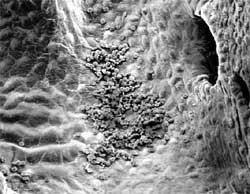Bad fats
 what kind of fat (and how much of it) is good for health? This is a question that has been intensely debated upon in the recent years with experts expressing diverse views. Most people, therefore, prefer to follow their doctor's advice: stick to a low-fat diet and save your heart.
what kind of fat (and how much of it) is good for health? This is a question that has been intensely debated upon in the recent years with experts expressing diverse views. Most people, therefore, prefer to follow their doctor's advice: stick to a low-fat diet and save your heart.
But a recent study dispels everything your doctor told you about fats. It is not the quantity but the kind of fat you eat that marks the difference between a healthy heart and a not-so-healthy one.
The study looked at the relation between intake of specific kinds of fats and the risk of coronary heart diseases in normal, healthy women. For this, over 80,000 nurses, between the ages 34 to 59, were kept under medical scrutiny. The results suggest that replacing saturated and trans-unsaturated fats with unhydrogenated monounsaturated fats prevents heart diseases.
Most coronary disorders are caused by trans (or hardened) fats. These are formed when liquid vegetable oils are processed to make hard or semi-soft cooking fats to prevent oxidation. The researchers, led by Walter C Willet from the Brigham Women's Hospital and Harvard Medical School, Boston, found that though a high intake of trans fat meant a greater risk of heart disorders, it seemed to make little difference if their total fat consumption amounted to 29 per cent or 46 per cent of their daily calories (The New England Journal of Medicine , Vol 337, No 21).
The study thus contradicts the popular opinion that eating less fat is good for health. In fact, it says that some carbohydrates should be replaced with monounsaturated or polyunsaturated fats. Moreover, the effects of fats depend on how they affect the hdl and ldl (two main types of cholesterol) levels in blood. Raising the hdl level protects against heart diseases, while a high ldl level increases the risks of clogging the blood vessels.
Trans fat interferes with the metabolism of polyunsaturated fatty acids that help prevent heart disorders. It also reduces hdl production but raises triglycerides and ldl levels. Saturated fat increases both hdl and ldl levels. The other main kinds of fat - monounsaturated fat and non-hydrogenated poly-unsaturated fat - are heart-friendly. Monounsaturated fats increase hdl while lowering ldl , and polyunsatura-ted fats lower ldl levels. This study confirms that on a gram-to-gram basis, trans fats were more harmful than unsaturated fats, with their tendency to raise blood levels of cholesterol.
However, there remain certain issues to take notice of. Firstly, this study, like all other researches, is only suggestive and not definitive. Control-led laboratory experiments with laboratory animals alone can help corroborate the results before people act on the basis of this research which says that it is okay to eat a high-fat diet provided the fats are heart-friendly ones.
However, it has been proved that cancers grow faster on a fat-rich diet. A high-fat diet leads to cancers of colon and rectum, prostrate, endometrium and possibly even of the breast.
Despite the study's support for a fat-rich diet, experts had earlier discovered that a diet low in fat helped heart patients to reverse their coronary disorders and thus reduce risks of future heart attacks. Medical experts still maintain that nothing can substitute a diet with plenty of fruits and vegetables.
Related Content
- WHO global report on sodium intake reduction
- Healthy and sustainable diets in Bangladesh
- Objection to the report of the Joint Committee by South India Krishna Oil and Fats regarding discharge of effluents by edible oil refineries, Krishnapatnam, Muthkur mandal, Nellore district, Andhra Pradesh, 06/01/2022
- Countdown to 2023: WHO report on global trans fat elimination 2021
- Draft Food Safety and Standards (Labelling and Display) Amendment Regulations, 2021
- Food security challenges and vulnerability in Small Island Developing States (SIDS)
